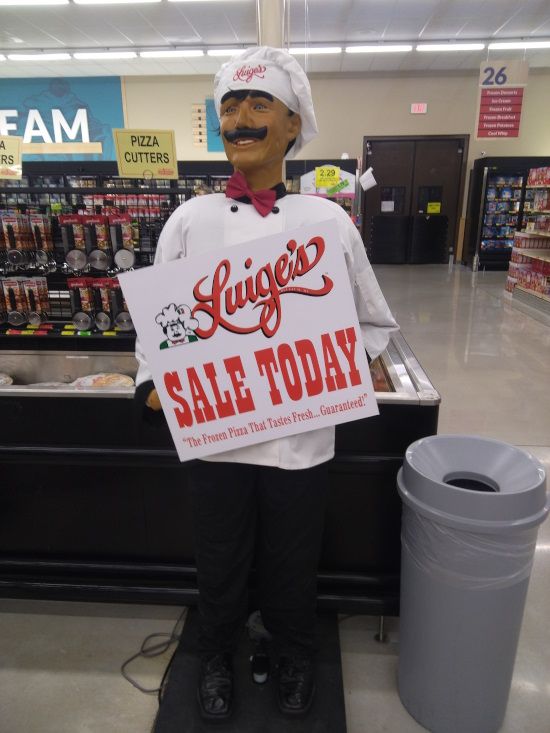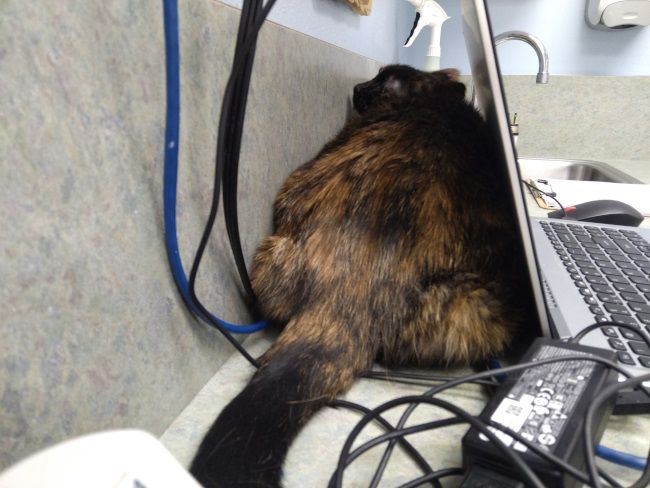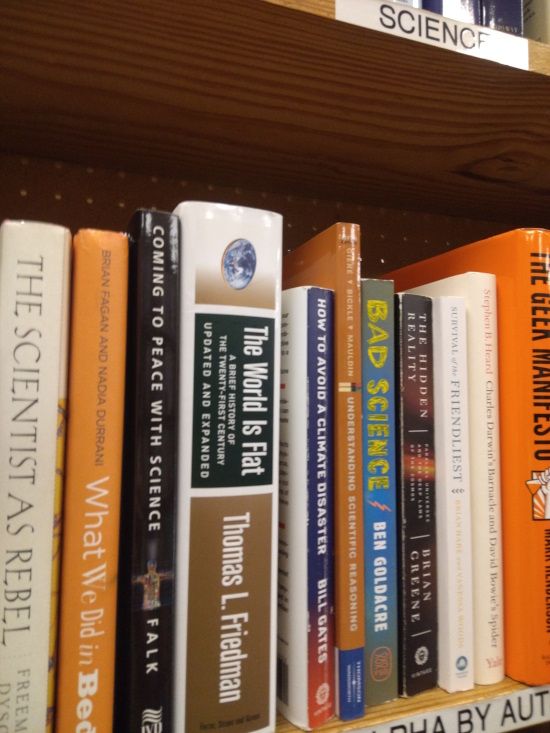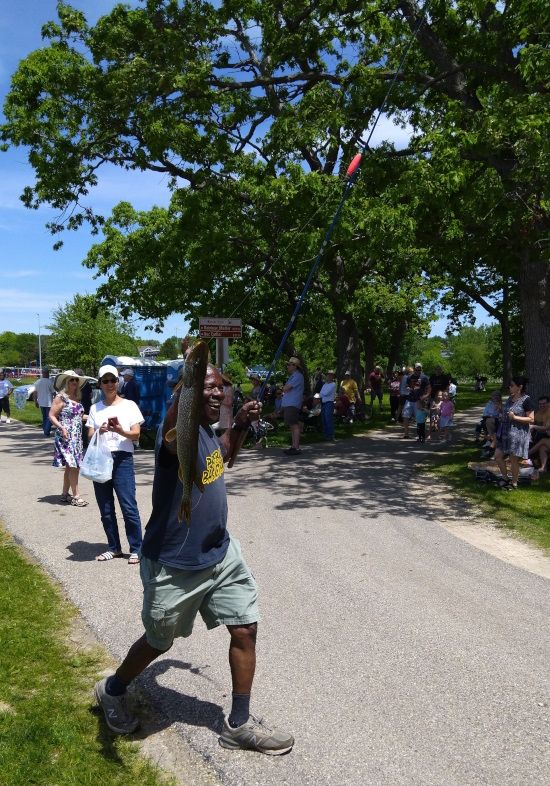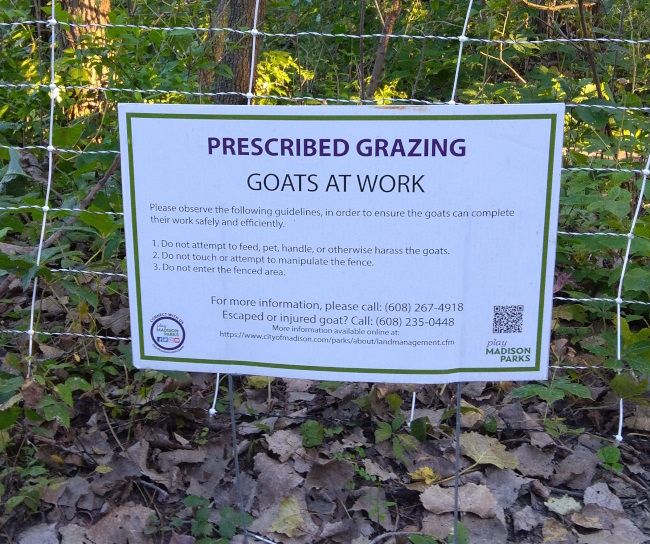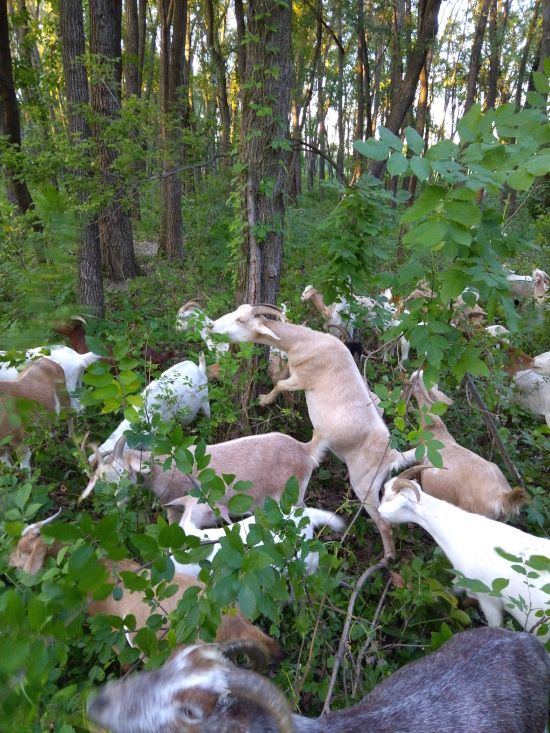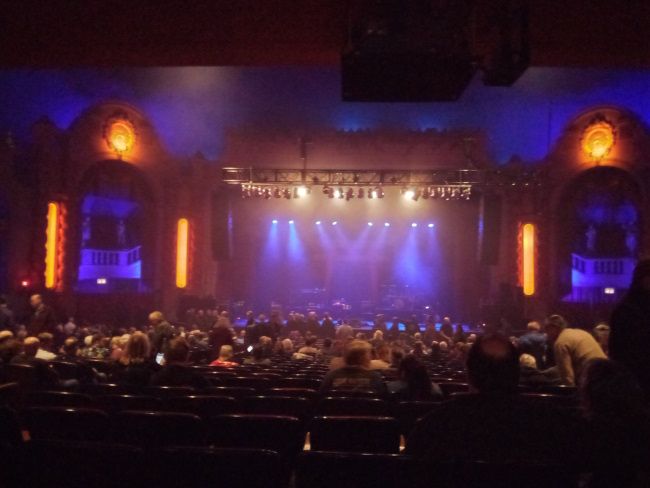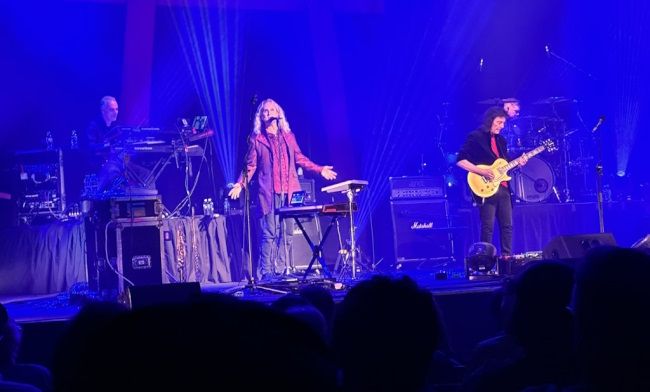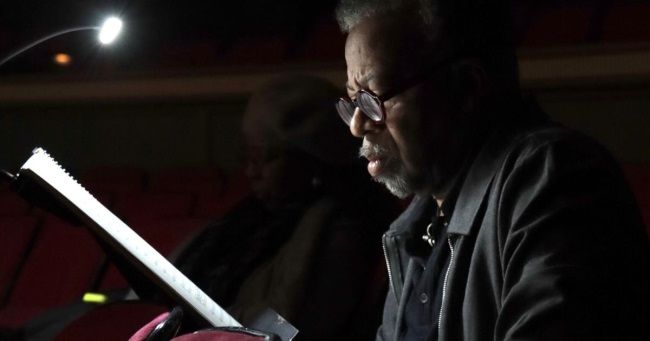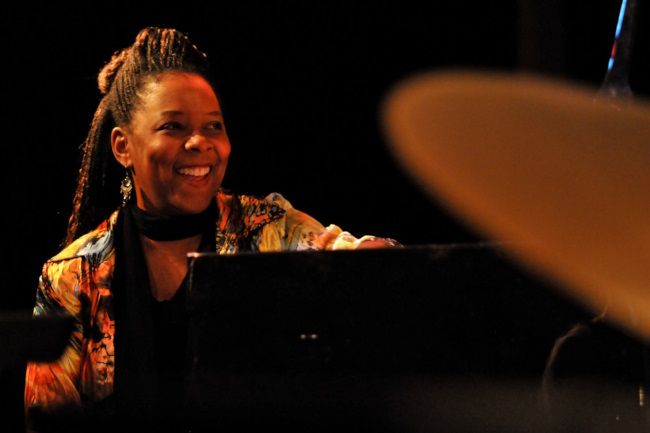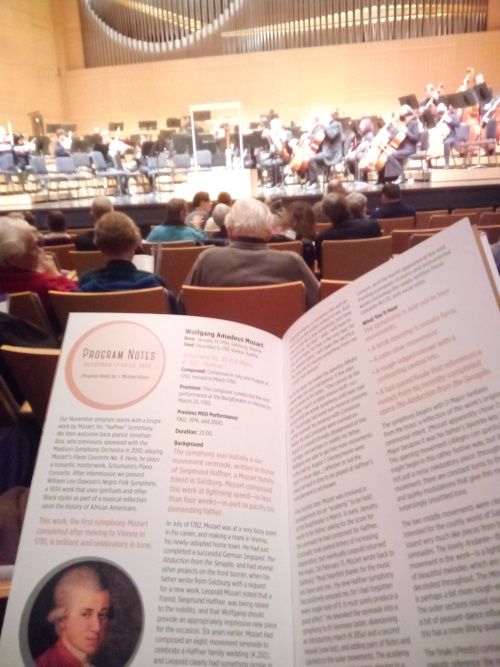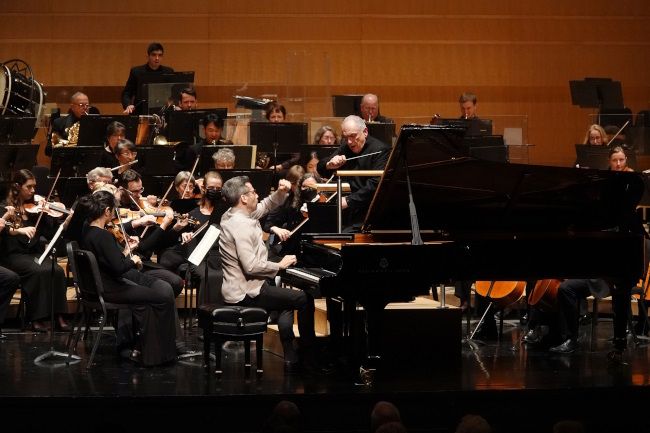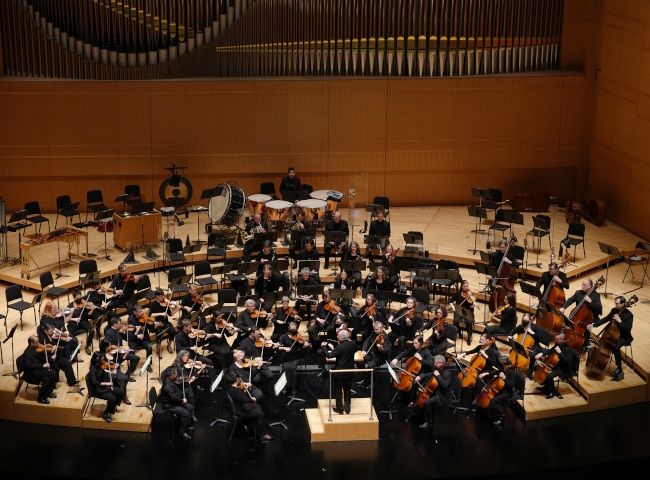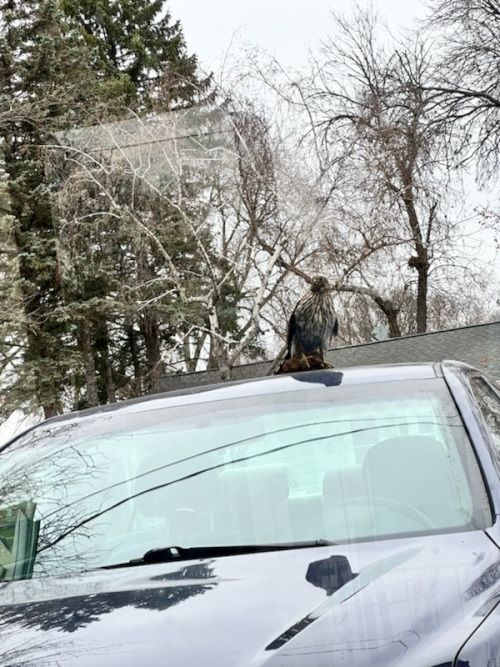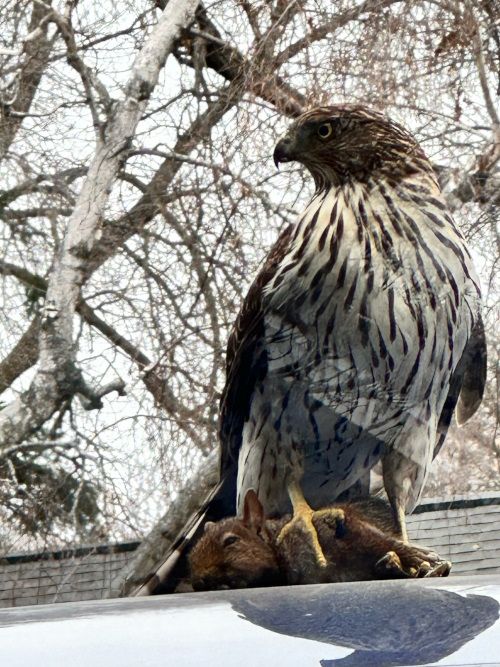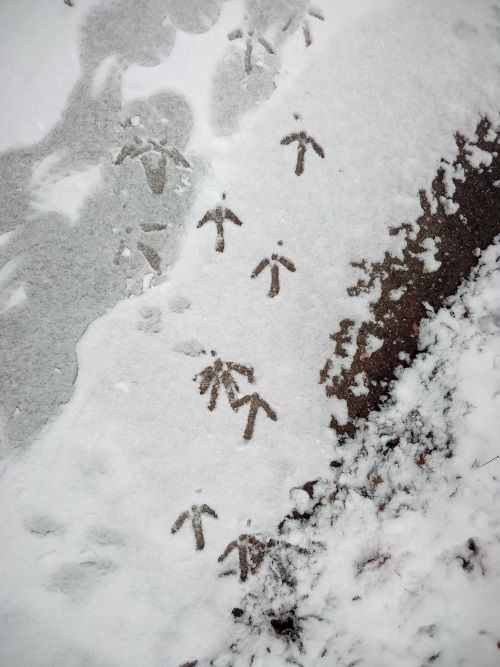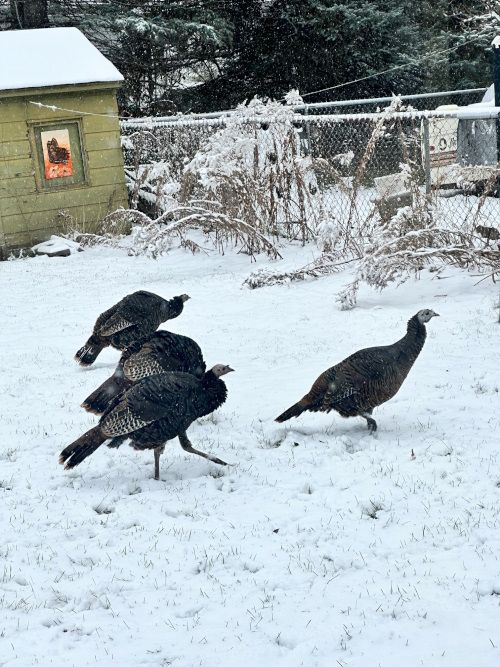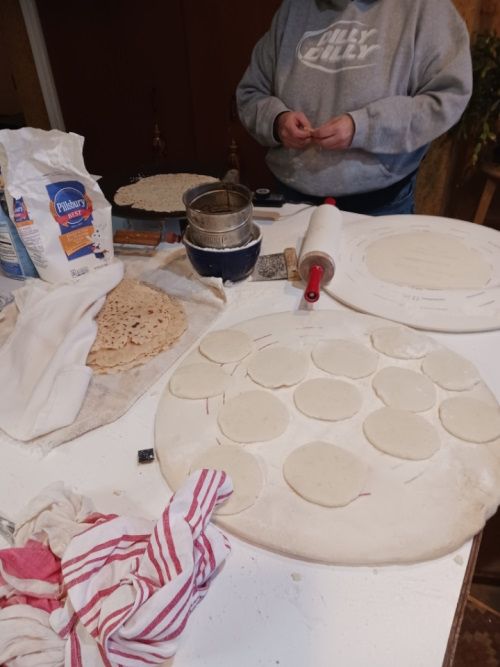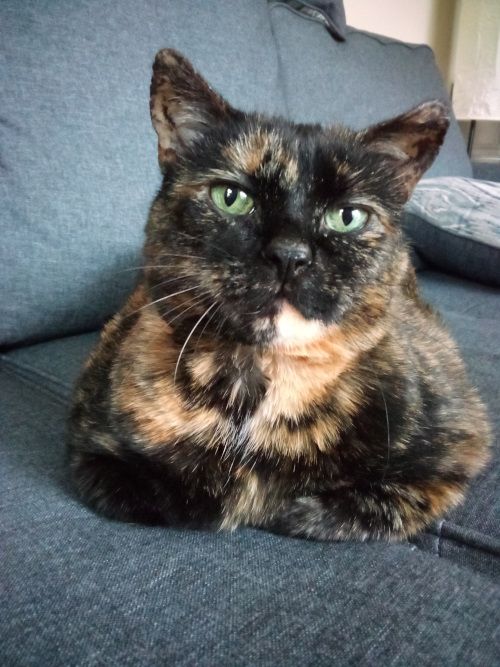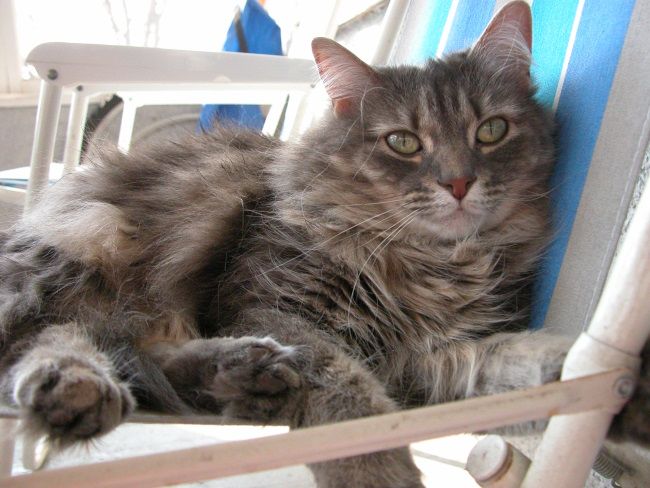(Read entry #116.)
24 September, 2024
21 September, 2024
From Silence to Somewhere. Repeat.
I have listened to this song by Wobbler about 4 times so far today. Longest earworm I've ever had, methinks. Or right up there, anyway.
19 September, 2024
Oh, just some random photos
Is anyone else spooked by the animatronic pizza guy at Woodman's in Sun Prairie?
Every time I walk by this creepy chef, I get Westworld vibes and envision the ominous pizzaiolo springing to life and rampaging through the frozen pizza section. Screams pierce the air and blood stains the freezers as it slings thin crust frozen pies like Oddjob threw his hat, severing the limbs of innocent shoppers. It would then grab the nearest Chicago deep dish and finish them off in a frenzy of bludgeoning.
How does one do aromatherapy if there's no aroma?
Note to Madison area folks: this stuff says right on the label that it doesn't work well with hard water. Yes, yes - I noticed the warning too late. I'm surprised it's even legal to sell this stuff here. Caveat emptor!
I made rye cardamom chocolate chip cookies recently.
While they were extremely tasty, I think a full bag of chips is overload for the recipe I used. (From King Arthur.) Plus the dough was crumbly so perhaps I'll try less flour next time as well.
Unsurprisingly, Piper still does not like going to the vet.
Did the clerk at Half Price Books not know who Thomas Friedman is or what his book is about? Or did some smart aleck customer play a joke on their fellow patrons?
An excited fisherman at WORTstock.
I saw the goats at Acewood Conservation Park.
Black Phillip is just out of frame.
The Corona Diaries Vol. 116: Play me my song
[View the foreward.]
(late November 2023)
Despite being nearly 3 months since Grabby's death, I still find myself waiting for her to come to the food dish at dinner time, to be on the bathroom counter when I step out of the shower, and to be present in any number of other situations. In my mind I can still picture that gimlet-eyed look she'd send my way when I entered a room where she was relaxing.
"Gotta keep an eye on those pesky humans!" she no doubt thought to herself.
I have also not stopped using her name. When I should be saying "Pipe!" or "Piper!", I am still exclaiming "Grabby and Pipey!" or "Grab and Pipe". Old habits die hard. Lord help me when we get another cat and I find myself blurting out three names.
While I wait for my brain to adjust, I figure it's best to keep myself occupied.
November started with a trip down to Chicago to see Steve Hackett in concert. He was the guitarist in the progressive rock band Genesis from 1970-77 and has 28 solo albums to his credit. He was to perform at the Copernicus Center, a venue I’d never been to.
Before the show, I met up with a quartet of friends/fellow concert goers at Iztatl Cocina Mexicana in Jefferson Park where I gorged myself on a tasty burrito as we chatted away until showtime was nigh. I’d gotten to know all of them through my brother and it seemed very fitting to be going to see Steve Hackett with them as he would have no doubt come along if he’d still been alive, work commitments notwithstanding.
Walking into the theater, I found it to be a beautiful, old venue.
I have since learned that it is the former Gateway Theatre, a movie palace dating back to 1930. It was the first movie theater in Chicago built exclusively for the talkies, apparently.
The show was similarly structured to the one my Frau and I had attended last spring in Minneapolis with a set of Hackett’s solo work followed by an intermission and then a second set comprised of Genesis material. I was delighted to find that our guitar hero had revamped the first set so that we were given a larger dose of his solo music and that it featured mostly different songs than he played last year. The second set was again a Genesis album in its entirety. However, instead of the live album Seconds Out, he played their 1972 opus Foxtrot.
It was a remarkable show! A couple of the songs from Foxtrot had never been played live by Genesis after the Foxtrot tour ended in 1973 and the band had never played one of the songs live ever. So it was a real treat to hear these rarely/never performed songs brought to life.
Again my eyes welled with tears during the 25 minute epic "Supper’s Ready" just as they had in Minneapolis. And just as he did last year, Hackett (and the band) brought the first set to a close with the instrumental section of "Shadow of the Hierophant". While I've always liked the song, I felt that Sally Oldfield's vocals on the studio version were rather twee for the longest time, as if they were some Hobbit maiden's hymn. At some point, I matured or got old or something and I just fell in love with them with their gentle clarity and delicate resonance. I hope to witness that song performed in full someday. And just as he did last time, Craig Blundell proved to be a monster on drums. His playing added so much excitement and dynamics to the performance. The song built in intensity with no small debt to his percussive prowess.
What a wonderful show!
Later in the month the Frau and I attended a performance by the Madison Symphony Orchestra and I am reminded that we went to see the Wisconsin Chamber Orchestra perform back in October. It had slipped my mind when writing the previous entry because, unlike the MSO, the WCO does not send you an email afterwards with photographs from the concert. Without the visual reminders, I forgot to mention it last time.
The performance was called Harmony in Black and was part of a WCO initiative to feature the works of underrepresented composers of color. It featured two pieces by Dr. Bill Banfield, composer in residence at the WCO.
In addition, there was a piece by Patrice Rushen, who has composed jazz and pop music and holds a chair at USC Thornton School of Music.
Their music drew inspiration from Frederick Douglass, Paul Robeson, and Dr. Martin Luther King and, I suppose, the black experience in America, generally.
Rushen’s "Mine Eyes Have Seen the Glory" opened the concert. Its three movements draw on King’s life and career. The first is called "Passion from the Pulpit" and began with an excerpt from King’s speech that contained the piece’s title. It then proceeds through a series of sections that alternate those that are faster with a dose of the dramatic and ones that are slower with a more pensive tone.
The second movement, "The Dreamer Cometh", is darker and moody. Perhaps it reflects King’s recognition of the struggles of his present and of his future while dreaming of the fulfillment of his life’s mission.
"Freedom Is Not Free" ends the piece. It begins with big, sweeping brass and transitions to a feeling of urgency led by a martial sounding snare drum. This tone would last until the piece reaches its denouement with another recording of King.
Banfield's "Testimony of Tone, Tune, and Time" reflected on Douglass and Robeson. The music was dotted with brief interludes featuring a narrator reading the words of these men. Joining the orchestra was a saxophonist who added tonal color as well as a distinct jazz element.
The 8 movements were fairly short and each had its own flavor. There was sadness, joy, tenderness, a contemplative mood, etc.
Another piece by Banfield, Symphony No. 8, closed the performance but my Frau's back pain was causing her extreme discomfort so we weren’t able to stay to hear it. Luckily the whole concert was recorded and is set to be released (even on CD!) in February.
Back here in November, the Frau and I attended a performance by the Madison Symphony Orchestra. We went down to the lovely Overture Center where we joined the great and the good for "Symphony Gems". On the bill were Mozart, Schumann, and William Levi Dawson.
I was unfamiliar with the opener, Mozart's Symphony No. 35 in D Major, K. 385, "Haffner". Almost right out of the gate the first movement was cookin'. The violinists were on fire and the piece really moved. Crescendos came replete with deep reinforcement from tympani.
The second movement was slower, but the violins couldn't be calmed completely as they contributed some rapid bowing to punctuate the gentle passages. Woodwinds were more prominent on the mid-tempo third movement while the fourth picked up the pace once again and the tympani made a triumphant return. It ended on a rousing note.
Schumann’s Concerto in A Minor for Piano and Orchestra, Op. 54 came next. Guesting on the piano was a gentleman named Jonathan Biss. Hailing from Philadelphia, his CV is chock full of performances with orchestras around the country and around Europe as well.
This was another piece that I'd never heard before and I was delighted by it. The first movement revels in dynamics. But whether it was a slow passage or something more spirited, Biss would throw in short bursts that cut through the symphonic sonorities of the orchestra. And then his playing became more sustained and melodic as the piano joined the orchestra in blissful melody.
The middle movement was slow and graceful while the final one upped the tempo again and featured some wonderful, dramatic soloing from Biss. That guy was animated too. There were times I thought he was going to jump up from the bench and launch into some kind of Jerry Lee Lewis routine.
William Levi Dawson's Negro Folk Symphony began slowly and a bit on the sullen side. Then waves of strings were joined by a simple tympani rhythm before the orchestra falls silent briefly. Brass takes over and a sprightly melody ensues. And so the first movement went with slow, gentle passages giving way to more rousing ones.
The second movement features slower, forlorn sounding sections sitting next to brighter, faster ones. This movement is called Hope in the Night and perhaps the slower parts are the night and the faster ones represent hope, some light in the darkness.
The third and final movement is generally upbeat with different parts of the orchestra repeating melodic lines in sequence. This final bit never really lets up and has an exuberance throughout that comes to a conclusion in the big, dramatic finale. O, Le’ Me Shine, Shine Like a Morning Star is an apt title.
********
We had a couple interesting animal sightings this month.
The first came when my Frau was out in the carport looking at her phone. Suddenly a loud noise rent the air...
THWAP!
She looked over at her car which was sitting in the driveway and saw that a hawk had landed on the roof.
Upon closer inspection, she discovered that Nature is truly red in tooth and claw as our avian visitor had come with its dinner.
Poor squirrel. But hawks gotta eat too.
We had a little snowfall one night and, upon going outside the following morning, I saw tracks.
There were turkeys about! I didn’t see them, however. Later, though, the Frau did. They were strutting through the backyard.
********
Just a day or 2 ago I received a text from a friend of mine that was simply a photograph.
That headless figure is his sister and she’s at their mom’s house up in Portage (about 30 miles north of Madison) making lefse.
Lefse is a Norwegian potato flat bread. While I have 3 brands on offer at my local supermarket, homemade remains the best. Folks in Wisconsin of Norwegian stock are known to make it for the holidays.
I replied saying I hoped that some of that would come my way.
********
Bonus photo. Here is a recent photo of Piper relaxing on the couch, no doubt patiently awaiting pets from her cat dad. Or perhaps wondering why he is putting this strange device in her face.
18 September, 2024
Not Just Another Record
Genesis released Abacab on this day in 1981. It was my brother's tape of this album that got me into the band back when I was 9 and made me a hardcore fan. This also led me down the path to becoming a proghead so it can fairly be said that it changed my life. And so the album has a special place in my heart.
This is "Me and Sarah Jane" live from Milwaukee on 16 November 1981.
15 September, 2024
The Corona Diaries Vol. 116 - Foreward: Gone but not forgotten
(Now read #116.)
10 September, 2024
Triumvirat of prog
We have a proggy trifecta of anniversaries today.
First we have Jethro Tull's Catfish Rising released this day in 1991. Perhaps not their strongest album, but it nonetheless has some fine music on it including the slightly lascivious "Like a Tall Thin Girl". Here it is from 25 November of that year at the Chicago Theatre.
09 September, 2024
Signals transmitted
Proggers love to release albums in late summer/autumn. Today we commemorate the day Rush released Signals back in 1982. It marks the start of a shift in their sound that brought synthesizers to the fore and saw the guitar shifting from lead riffing to more of a rhythm role, adding color and texture.
This is "Chemistry" from the 1982 tour stop in Milwaukee.
08 September, 2024
Imagination on fire
This is where I boarded the Rush train back in 1987. Hold Your Fire. A desert island disc for me. Perhaps their most beautiful album. Released on this day 37 years ago.
Here is "Prime Mover" from Milwaukee on 5 April 1988.
07 September, 2024
Grateful.
Comedienne and writer Bridget Phetasy was a recent guest on the Maiden Mother Matriarch podcast which is hosted by the English social critic and author Louise Perry. Phetasy's "How divorce never ends" was recently published in the U.S. edition of The Spectator, a UK-based publication and this seems to have prompted the invitation to appear on the podcast, although other topics were discussed.
During the interview Phetasy largely reiterated and expanded upon the article. Its precis, at the most basic level, is simply that divorce hurts children and that the negative consequences redound into adulthood for people whose parents divorce. While not advocating for the abolition of divorce, she quipped on the podcast that it should be "safe, legal, and rare". If your husband is abusing you and/or your children, for example, then divorce is warranted. Simply wanting to be single so you can go on a voyage to discover yourself does not warrant the end of a marriage, in her opinion.
That divorce hurts children isn't controversial. But that it should be an act of last resort is, apparently, these days, for many. Phetasy's piece serves as a riposte to the likes of Lara Bazelon's 2021 New York Times essay, "Divorce Can Be an Act of Radical Self-Love". I am not sure how common Bazelon's egoistic laissez-faire attitude towards marriage is but Phetasy argues that it is ascendant in our culture and that many abdicate responsibility and view commitment in cold, Lockean terms of contract.
Reading Phetasy and listening to her interview got me thinking about the dissolution of my parents' marriage and how it affected me.
Back when I was 13 or so, my father saw a notice on the announcement board at the office one day saying that his employer was looking for people to take an early retirement. (The company was downsizing.) He immediately made his way to HR and volunteered - without consulting my mother.
A year or so later my parents had sold our home in Chicago and purchased one in west central Wisconsin. My father and brother made the trek north in April while my mother and I remained in Chicago until the school year ended in June.
When we finally arrived at the new house out in the boonies, my parents' marriage was already over. I didn't know it at the time and I don't know if my mother did.
My father greeted us at the door shirtless and tanned from working outside. He was also a bit drunk. I can picture in my mind the smile on his face that I now know disguised his true feelings. After a short time spent unpacking and settling into my new bedroom, my father said he wanted to take me into town - Eau Claire - and show me around.
This was a lie.
Rather than cruising around town to get a feel for it, we went straight to the bar of a bowling alley where my dad drank martinis and chatted with the blonde bartender. Sitting there nursing a soda and looking around uncomfortably, if not in total disbelief, I couldn't have imagined that she would become my stepmother.
After an unknown amount of time which seemed like days, my father announced that we were heading out. I felt a wave of relief wash over me. However, the bartender's shift had ended and instead of going home, we went to her apartment where I ended up watching some TV with her daughter, who was 5 or so years older than me, while my dad and his new girlfriend carried on in the kitchen.
My soon to be stepsister was very nice to me and I have never had reason to complain about her. Still, I did not want to be there and kept glancing towards the kitchen for a sign that we'd be leaving soon. Instead I caught sight of my father laughing with his pecker hanging out of his shorts while his girlfriend, thoroughly embarrassed, hastily tried to get him to put the thing away.
Truthfully, we probably weren't there very long but every second seemed like an eternity to the 14 year-old me. When we left, my father declared himself to be too drunk to drive and that I'd have to shuttle us home.
It wasn't too long before I noticed that my father was never around. He had moved out of the house and into an apartment in Eau Claire. I admit that I wanted nothing to do with my father at this point and it seems he felt much the same way.
Busy establishing a new life with his girlfriend, he never made any attempts to be a father or to reach out in any way to me unless prompted by my mother. Some of my grades were slipping at this time so, when we'd get together for dinner, conversation was dominated by expressions of his disappointment in me and mild threats of repercussions if I didn't do better in school.
By this time, my brother had moved back to Chicago and my mother followed suit after I started college.
I cut off most contact with my father after high school and he reciprocated. He didn't tell me of his cancer diagnosis and I never went to see him during his treatment after I had heard of his illness from someone else.
I lived at his house the summer after my freshman year of college and reached a kind of détente with him. We treated one another politely but kept each other at a distance. Come August I made Madison my permanent residence and home.
********
A couple weeks ago I heard the news that the father of a friend of mine from high school had died. I, being rather out of touch with events from my old stomping grounds, found out a couple months or so after he had passed and 4th or 5th hand.
My friend and I had lost touch back in the mid-90s when he married and, if I recall correctly, began his new life way up north while I was busying doing the same to the south. Nothing unusual, no falling out. I also lost touch with his parents at the same time.
Shortly after hearing the unfortunate news, I found that it had made me profoundly sad, even to the point of tears welling in my eyes. I was genuinely shaken.
I am going to call my friend's father S here and his mother T.
When I knew them, S and T were hippies. I don't mean that in a derogatory way or that they in any way put on pretenses. From what I recall, they lived in or near San Francisco's Haight-Ashbury neighborhood in the late 60's before moving to Colorado. Their Rocky Mountain sojourn didn't last too long and they would go on to settle down in west central Wisconsin.
Unlike a lot of their counterculture peers, S and T never abandoned their ideals to become 80s cocaine addled cliches on Wall Street. They lived on a small farm. S had long hair and an equally long beard which caused many a local to declare that he looked like Jerry Garcia even though he didn't. He did, however, love the Grateful Dead and I recall him working in a barn and on a tractor with a Dead bootleg playing on a nearby boom box. He'd been a pig farmer at one point but gave that up, though he still practiced the swine trade now and again for his family's consumption or as a favor to a friend.
For her part, T was a nurse. She was the exact opposite of 80s trends and excesses. No poofy Aquanet-laden hair and I think shoulder pads were forbidden on their property. Instead she refused to shave her legs or armpits. T was also a wonderful cook and baker and I recall smelling the bread she made as it baked. Later I would eat it along with eggs collected that morning from their chicken coop and bacon from a pig that had lived in a pen not far from the coop.
T and S were both smart, kind, and cheerful people. (T is still with us, to the best of my knowledge, and I hope she remains so.) They took the whole "back to the land" ethos to heart and lived it and I felt and continue to feel great respect for the way they chose a lifestyle and refused to abandon their principles.
Many people in the area were suspicious of T and S and held them in low regard. Because they were hippies, there were those who denounced them as pot smoking druggies while the goat skulls on the barn door were, some surmised, surely a sign of Satan worship. I ran into precious few people who took them at face value instead of feeling wariness and keeping them at arm's length. There must have been a fair amount opprobrium directed at them.
When S died, I fondly recalled the gentle mock sneer in his voice when he called my friend and me "teenagers" or me "that kid from down the road". The first time I ever had a hangover was on my birthday one year at their house. My friend and I both woke up feeling terrible from all the rum we had consumed and S cranked up "Birthday" by The Beatles quite loudly. (It was one of those original numbered copies of The White Album from back in 1968.) The song echoed through my skull and amplified the throbbing ache that was consuming my brain. S stood there with a wide trickster grin as my friend and I clutched our heads and grimaced in pain.
While I never viewed S as a surrogate father, perhaps he was. Certainly a mentor. He looked out for me. When a classmate got pissed off at my friend and me and decided that we needed to meet his shotgun, S was there to calm our nerves and offer protection and reassurance.
He didn't just point out when I had screwed up, as was my father's wont, he also offered words of praise and encouragement. S made the ability of my friend to go out and have fun contingent upon getting work done. And so I, a city kid, found myself helping to collect eggs, slop pigs, throw hay bales around, etc., things that I never dreamed of doing when I lived in Chicago.
S had a wonderful sense of humor that could be wicked. One time I went with him and my friend to protest the pro-lifers in front of the Planned Parenthood in Eau Claire. S dressed as the Easter bunny and held up a sign saying something to the effect of, believing in me is just like sharing their beliefs.
Both T and S were extremely welcoming and kind to me. S provided paternal guidance to my lost teenage self when my own father wanted nothing to do with me. As a middle-aged man I look back and see how he was a role model for me as I was developing into a man. He showed that kindness and strength were not mutually exclusive. S demonstrated that there was more to being a father than exacting discipline. For all of this and more, I am ever grateful. I wish that I'd thanked him in-person. (And Uncle Des too.)
And so I raise a glass to S's memory - and to T as well. Thank you for all you did.
03 September, 2024
Rolling those bones for 33 years
Rush released Roll the Bones on this day in 1991. I recall bringing that tape home, if not that day, then shortly thereafter. "Dreamline" has been a favorite ever since and here's a live version of it from Milwaukee in a couple tours later in 1996.
01 September, 2024
A proggy anniversary twofer
Today is an anniversary twofer! First is Rush's A Farewell to Kings.
Released this day in 1977, A Farewell to Kings sees Rush continuing to thumb their noses at expectations and go all in on progressive rock at the height of punk. A month before the recording of the album commenced the band played at the Riverside Theater in Milwaukee where they debuted a new song, "Xanadu" which would become one of the most beloved songs on A Farewell to Kings. This musical adaptation of Coleridge would remain in setlists more or less until the very end.
This is the earliest known live recording of it from 10 May 1977 in Milwaukee.
